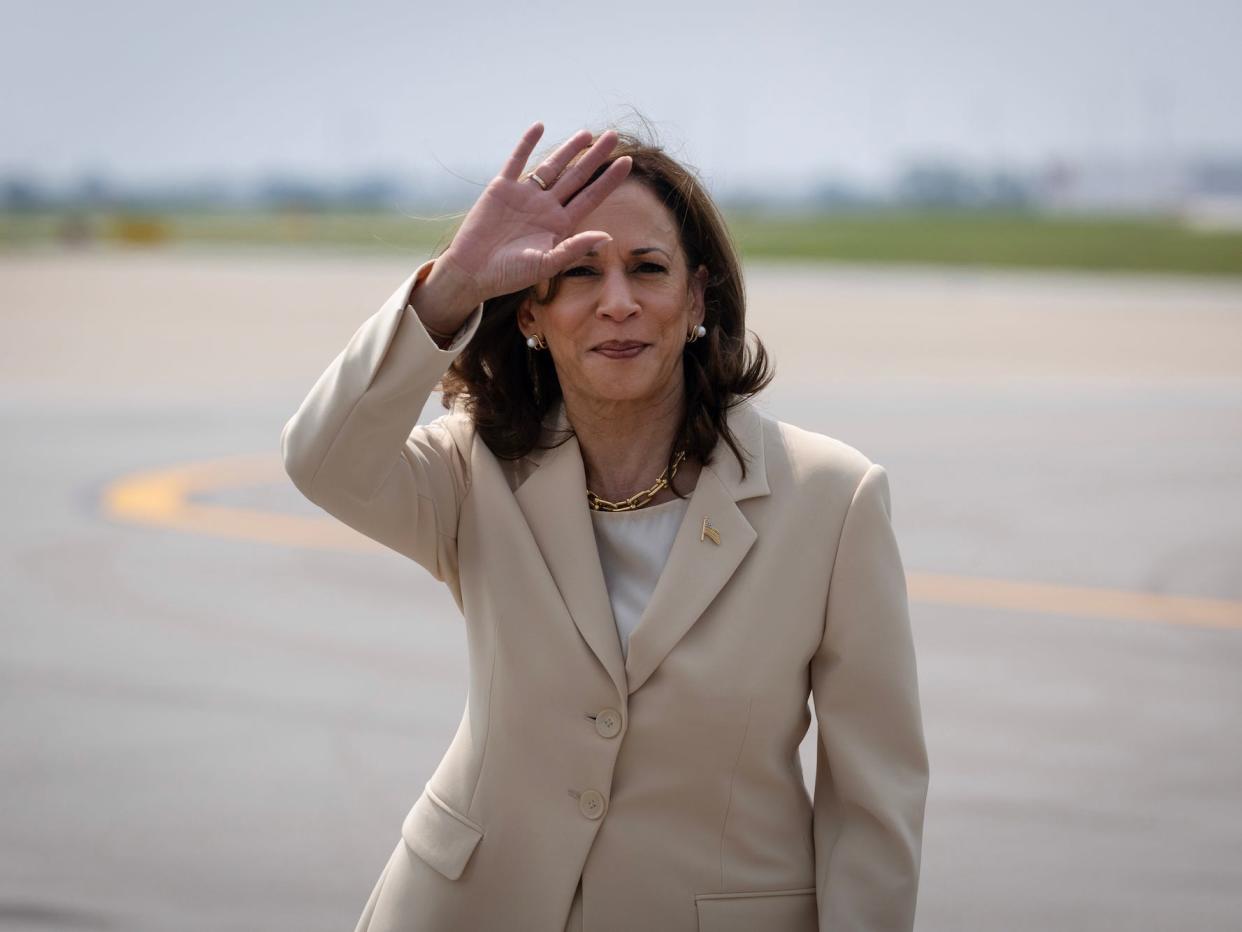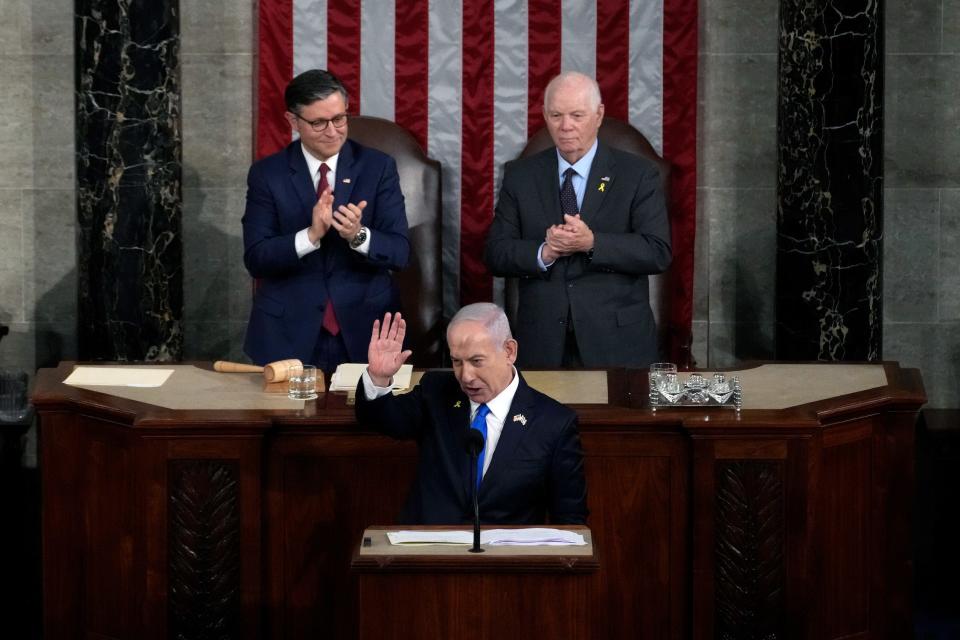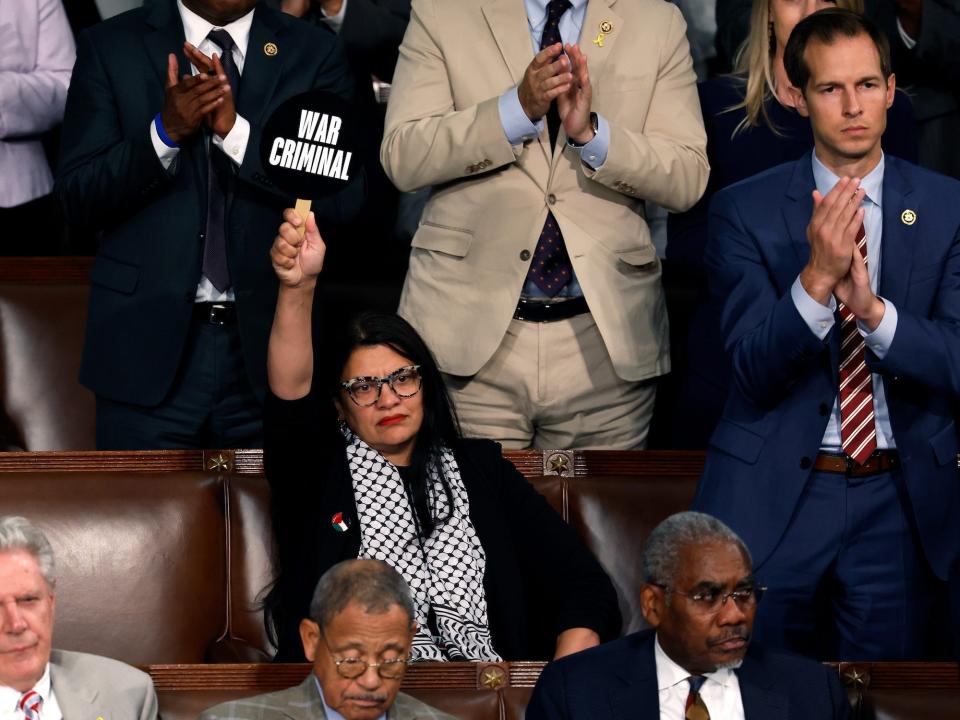The elephant not in the room for Netanyahu's speech: Kamala Harris

- Oops!Something went wrong.Please try again later.
- Oops!Something went wrong.Please try again later.
- Oops!Something went wrong.Please try again later.
Israeli Prime Minister Benjamin Netanyahu delivered a speech to Congress on Wednesday.
Dozens of Democrats skipped the address — including Vice President Kamala Harris.
Progressives hope that she'll chart a new path on Israel as the Democratic nominee.
Speaking to a crowd of roughly 100 people just a stone's throw from the US Capitol complex on Wednesday morning, Linda Sarsour argued that pro-Palestinian activists were responsible for President Joe Biden's decision to forfeit a second term in the White House.
"They'll never give us that credit," said Sarsour, a Palestinian-American activist and former Women's March leader. "But they better know that I will never believe that one dismal performance at a debate was the reason why Joe Biden is no longer the Democratic nominee."
Roughly 20 New York police officers streamed by on bikes. Security had been beefed up. In just a few hours, Prime Minister Benjamin Netanyahu would address a joint session of Congress, and Vice President Kamala Harris would not be there in her usual presiding role, traveling instead to Indianapolis to speak at the historically Black Zeta Phi Beta sorority's convention.
"That's not by accident, my friends," Sarsour said. "That's just not because she happens to be in Indianapolis. That is a strategic political calculation, because she knew — and her people knew — that you will not reach the White House if you frolic with war criminals."
Sarsour's argument about Biden doesn't exactly hold water. It was, without question, Biden's disastrous debate performance that forced him from the race after three painful weeks of Democratic hand-wringing about the issue. Until the debate made questions about his age unavoidable, it was Biden's staunch support for Israel that seemed to pose the greatest threat to his candidacy. But it was also progressive lawmakers, who've generally been the most outspoken about the destruction in Gaza, who chose to remain behind Biden.
But Sarsour's observation about Harris's absence, whatever the White House may say about scheduling, was shared by progressive Democratic lawmakers who would like to see the United States take a different approach toward Israel — and who are openly pining for Harris to break with Biden.
"It's a pretty big symbolic statement," Rep. Ro Khanna told me, referring to Harris's absence. "I think she has an opportunity to have a clean break from the administration."

The California Democrat argued that Harris should look toward the example of Vice President Hubert Humphrey. After President Lyndon B. Johnson withdrew from the 1968 presidential race amid critics of his handling of the Vietnam War, Humphrey entered the race, eventually calling for peace talks. "When Humphrey did that, his poll numbers skyrocketed," Khanna said. "And he almost won."
'A very tenuous feeling'
If Netanyahu's speech on Wednesday was any indication, there's plenty of wiggle room for Harris to pursue a less deferential approach to Israel than Biden. Only about half of House and Senate Democrats even showed up for the speech. Dozens of progressives issued statements affirming that they were boycotting the speech, engaged in other events, or like Harris, simply came up with convenient scheduling conflicts.
Part of the issue is Netanyahu himself. He's long been a polarizing figure in American politics, generally enjoying closer relationships with Republicans than Democrats. The last time he addressed Congress in 2015 — where he railed against then-President Barack Obama's nuclear deal with Iran — dozens of Democrats also skipped the event.
"We just don't agree with his policies and who he is. He's literally the Trump of Israel," Rep. Maxwell Frost of Florida told me. "He wants Trump to win. He wants to undermine the President and the Vice President. [Boycotting] makes a lot of sense to me."
Netanyahu is also a controversial figure at home, facing criticism for failing to stop the October 7 Hamas attacks and widespread protests last summer over his attempted judicial reform. Rep. Becca Balint of Vermont, a progressive Jewish Democrat, told me she would be boycotting the speech in part because her friends in Israel felt "let down by Netanyahu."
"I feel like giving him this platform right now is the absolute wrong thing," Balint said. "He should be spending every waking moment trying to secure the release of the hostages and bringing an end to this war. This feels like just a way for him to further his own political future."
Though much of the Prime Minister's speech was about topics that garner bipartisan sympathy — particularly the threat posed by Iran and the ongoing efforts to rescue Israeli hostages in Gaza — there were also aspects of the speech that were clearly aimed at ginning up the majority-Republican audience that showed up for him.
"Some of these protestors hold up signs proclaiming 'Gays for Gaza,'" Netanyahu said. "They might as well hold up signs saying 'Chickens for KFC.'"
Overall, the speech proceeded without any vocal disturbances. Rep. Rashida Tlaib, the sole Palestinian American member of Congress, held up a sign that blared "War Criminal." Afterward, former House Speaker Nancy Pelosi said the speech was "by far the worst presentation of any foreign dignitary" invited to Congress.

As of now, it remains unclear whether Harris's approach to the conflict would differ from Biden's. After all, she's his vice president and thus shares some degree of responsibility for the actions that progressives and "uncommitted" voters have been protesting for nearly a year. Her meeting with Netanyahu on Thursday may provide some early indications of any potential policy differences.
At the very least, her rhetoric on the issue appears to be tougher than Biden's. In March, she became the first member of the Biden administration to call for a cease-fire, though she was referring to a temporary one that was part of a broader framework proposed by the White House. She has generally been more willing to publicly criticize Israel. And she has expressed more sympathy for pro-Palestinian protesters than Biden often has, telling The Nation that those demonstrators are "showing exactly what the human emotion should be."
"I think it's incredibly important right now that she distinguishes herself on this issue," Rep. Summer Lee of Pennsylvania told me. "There are a lot of people who are experiencing an energy, a hopefulness that we haven't seen in a really long time in politics. And it's obviously also a very tenuous feeling."
Read the original article on Business Insider

